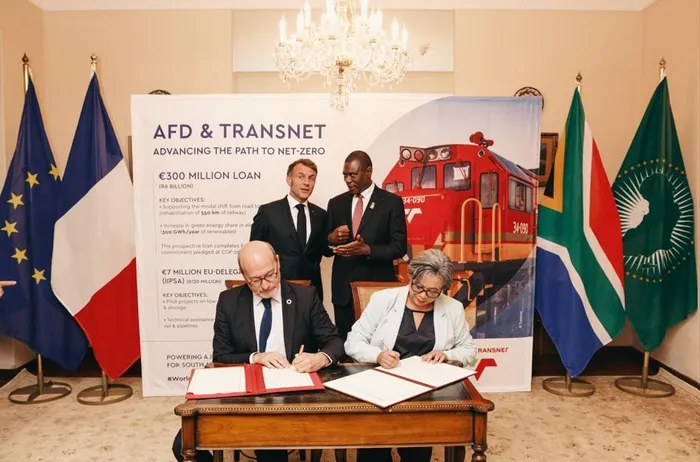Industry questions motives behind Transnet’s R6bn AFD loan as concerns rise over conditions

French Development Agency CEO Rémy Rioux and Transnet Group CEO Michelle Phillips signing the agreement for the R6 billion) sustainability-linked loan overseen by French President Emmanuel Macron and Deputy President Paul Mashatile on the sidelines of the G20 Leaders' Summit in Johannesburg.
Image: Supplied
Industry players have raised fresh questions over the motives and conditions behind the €300 million (about R6 billion) loan granted to Transnet by the French Development Agency (AFD).
This comes after Transnet on Tuesday announced the sustainability-linked loan from AFD, with the support of the European Union (UE), as a major initiative to accelerate its transition toward net-zero emissions.
Transnet Group CEO Michelle Phillips said the funding package from AFD will assist the State-owned freight and rail operator in revitalising its infrastructure while supporting the clean energy initiatives under the capital investment programme.
“In addition, this initiative will contribute significantly to supporting Transnet’s decarbonisation journey while actively exploring the company’s strategic role and potential opportunities within the green hydrogen value chain,” Phillips said.
As a sustainability-linked loan, disbursements will be tied to progress on strategic targets. These include diversifying into transition minerals and increasing the use and purchase of 300 GWh of renewable electricity per year, equivalent to 20% of Transnet’s electricity needs.
But the deal has sparked criticism from some experts, who say the arrangement reflects South Africa’s growing inability to finance its own infrastructure.
Bongani Mankewu, director of the Infrastructure Finance Advisory Institute (InfraFin), said the reliance on foreign lending underscores “South Africa’s incapacity to raise domestic capital,” warning that the country appears not to have learned from the resource-curse theory.
“South Africa appears to learn nothing from the resource-curse theory, which suggests that countries with abundant natural resources typically experience slower economic growth and poorer industrial development than countries with less natural resources,” Mankewu said.
“The Dutch Disease Effect, revenue volatility and macroeconomic instability, institutional weakness, and the rent-seeking viewpoint are some of the structural and institutional reasons responsible for this paradoxical result, which is sometimes called the paradox of plenty."
Mankewu also cited the disastrous 1064 locomotives project, which spiralled to more than R50bn, crippled South Africa’s rail sector and left it without adequate trains, as a prime example of how poorly governed mega-deals can trigger fiscal strain and undermine industrial capacity.
“The resource-based development approach contends that, given solid connections and efficient governance systems, natural resources can act as a catalyst for industrial development and sustained growth, in contrast to the pessimism of the resource-curse,” he said.
“Infrastructure is a stimulant for economic growth when transactions are set up to put the interests of the nation ahead of those of rent-seekers, which usually results in corruption. It becomes regrettable when it is used for political posturing.”
The French contribution will also aim to promote a shift from road transport to rail, including the rehabilitation of 550km of railway. It will participate in the modernization of port infrastructure, strengthening service quality, reliability, competitiveness, and overall attractiveness across Transnet’s network.
However, this also raised concerns from the Road Freight Association (RFA), the largest and most comprehensive national trade association for the trucking industry that transports vast commodities by road.
“The specific sections and routes that would be part of the 550km are, of course, of extreme importance in ensuring the whole logistics chain is brought back to top efficiency,” said Gavin Kelly, CEO of the RFA.
“The Association must raise the point that - given the numerous bailouts forwarded to Transnet in the last 24 months: why does Transnet need to accept foreign loans to maintain (rehabilitate) its infrastructure? Were the large allocations from the tax payer not for this very use (maintenance, repair and rehabilitation)?”
However, Kelly said it is encouraging that foreign capital is flowing into Transnet. He said the hope is that the objectives will be met and the loan will allow for expedient growth in both efficiencies and capability (cargo volumes).
“In addition - the RFA notes the drive by Transnet to green hydrogen. It is important that whatever programmes, generation capacity, storage and related skills development programmes and the resulting employment opportunities are entirely sustainable within the South African economy and society,” he said.
“The RFA looks forward to the successful implementation and long term sustainability of the programme."
BUSINESS REPORT